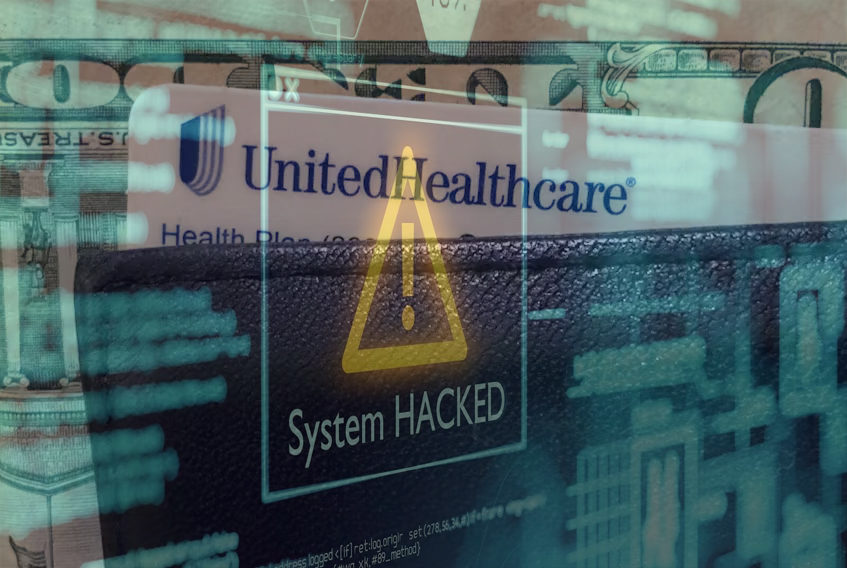04:58:18 pm 03/09/2024
Viewed: 7472
Addressing the Fallout of a Massive Health Data Hack: Urgent Measures and Industry Response
In the wake of a significant data breach that disrupted administrative functions across the healthcare sector, U.S. health officials have issued a call to action for insurance companies and Medicare contractors to mitigate the aftermath promptly.
The incident, which affected Change Healthcare, a subsidiary of UnitedHealth Group responsible for processing billions of health-related transactions annually, sent shockwaves through the industry. Hospitals, doctors, pharmacies, and millions of patients found themselves grappling with a digital logjam, unable to perform essential tasks like billing for services and obtaining prescriptions.
According to reports, the attack was orchestrated by a ransomware group known as ALPHV or Blackcat, underscoring the persistent threat posed by cybercriminals to the healthcare infrastructure.
To address the immediate challenges stemming from the hack, the U.S. Department of Health and Human Services (HHS) has urged insurers to waive prior authorizations and Medicare contractors to accept paper bills from healthcare providers. These temporary measures seek to alleviate the administrative burdens caused by the disruption.
Furthermore, HHS has called upon UnitedHealth Group to prioritize the restoration of operations to ensure continuity of care for patients and healthcare providers alike. The federal government has advised Medicare health plans to relax requirements for prior authorization and timely filing of payment claims, while also encouraging private Medicare plans to offer advance funding to impacted medical providers.
In response to the crisis, healthcare organizations have voiced concerns over the proposed assistance plans, with the American Hospital Association criticizing the limited eligibility and terms of UnitedHealth's financial proposal. Meanwhile, the American Medical Association has called for emergency financial relief to support physicians facing financial hardships due to the cyberattack.
This incident serves as a stark reminder of the growing threat posed by cyberattacks in the healthcare sector. With data breaches becoming increasingly commonplace, it is imperative for industry stakeholders to bolster cybersecurity measures and collaborate closely to safeguard patient information and maintain essential healthcare services.
As the healthcare landscape continues to evolve in the digital age, addressing cybersecurity vulnerabilities must remain a top priority to ensure the resilience and integrity of the healthcare system.
A very simple solution is to move our healthcare infrastructure from the internet altogether. Creting a private network for providers is key to security. However this will cut into the enormous profits the insurance companies currently enjoy so it is not even on the table. Especially since the costs under leaving it on the internet are totally expensed to the customer.
Enhanced Security: Private networks provide a higher level of security compared to the public internet. By isolating healthcare systems and data within a private network, organizations can implement stricter access controls, encryption protocols, and intrusion detection systems to protect against unauthorized access, data breaches, and cyber threats. This is crucial for safeguarding sensitive patient health information (PHI) and complying with regulations such as HIPAA (Health Insurance Portability and Accountability Act) in the United States.
Improved Compliance: Healthcare organizations are subject to stringent regulatory requirements regarding the privacy and security of patient data. Operating within a private network allows organizations to maintain better control over data transmission, storage, and access, facilitating compliance with regulatory standards and avoiding potential penalties or legal issues.
Network Segmentation: Private networks enable healthcare organizations to segment their network infrastructure based on different levels of sensitivity and access requirements. This allows for the isolation of critical systems and PHI from less secure areas of the network, reducing the risk of unauthorized access and limiting the impact of security incidents.
Faster Data Transfer: Private networks typically offer higher bandwidth and lower latency compared to the public internet. This enables healthcare providers to transfer large volumes of medical data, such as diagnostic images, electronic health records (EHRs), and telemedicine consultations, more quickly and reliably, supporting timely patient care and decision-making.
Reliable Connectivity: Private networks provide dedicated connections between healthcare facilities, clinics, laboratories, and other stakeholders within the healthcare ecosystem. This ensures reliable and consistent connectivity, even in remote or underserved areas where internet access may be limited or unreliable, thereby enabling seamless communication and collaboration among healthcare providers.
Protection Against External Threats: Private networks are shielded from common internet-based threats, such as malware, phishing attacks, and distributed denial-of-service (DDoS) attacks. By minimizing exposure to external threats, healthcare organizations can reduce the risk of disruptions to essential services, ensuring continuity of care for patients.
Control Over Data Governance: With a private network, healthcare organizations have greater control over data governance policies, data sharing agreements, and data retention practices. This allows them to establish clear guidelines for managing patient data responsibly, maintaining patient privacy, and facilitating secure data exchange with authorized partners and stakeholders.
In summary, a private network offers healthcare organizations a secure, reliable, and compliant infrastructure for managing sensitive patient data, supporting critical healthcare operations, and enabling seamless communication and collaboration across the healthcare ecosystem. By leveraging the benefits of a private network, healthcare providers can enhance patient care, improve operational efficiency, and mitigate the risks associated with cybersecurity threats and regulatory non-compliance.
In the wake of a significant data breach that disrupted administrative functions across the healthcare sector, U.S. health officials have issued a call to action for insurance companies and Medicare contractors to mitigate the aftermath promptly.
The incident, which affected Change Healthcare, a subsidiary of UnitedHealth Group responsible for processing billions of health-related transactions annually, sent shockwaves through the industry. Hospitals, doctors, pharmacies, and millions of patients found themselves grappling with a digital logjam, unable to perform essential tasks like billing for services and obtaining prescriptions.
According to reports, the attack was orchestrated by a ransomware group known as ALPHV or Blackcat, underscoring the persistent threat posed by cybercriminals to the healthcare infrastructure.
To address the immediate challenges stemming from the hack, the U.S. Department of Health and Human Services (HHS) has urged insurers to waive prior authorizations and Medicare contractors to accept paper bills from healthcare providers. These temporary measures seek to alleviate the administrative burdens caused by the disruption.
Furthermore, HHS has called upon UnitedHealth Group to prioritize the restoration of operations to ensure continuity of care for patients and healthcare providers alike. The federal government has advised Medicare health plans to relax requirements for prior authorization and timely filing of payment claims, while also encouraging private Medicare plans to offer advance funding to impacted medical providers.
In response to the crisis, healthcare organizations have voiced concerns over the proposed assistance plans, with the American Hospital Association criticizing the limited eligibility and terms of UnitedHealth's financial proposal. Meanwhile, the American Medical Association has called for emergency financial relief to support physicians facing financial hardships due to the cyberattack.
This incident serves as a stark reminder of the growing threat posed by cyberattacks in the healthcare sector. With data breaches becoming increasingly commonplace, it is imperative for industry stakeholders to bolster cybersecurity measures and collaborate closely to safeguard patient information and maintain essential healthcare services.
As the healthcare landscape continues to evolve in the digital age, addressing cybersecurity vulnerabilities must remain a top priority to ensure the resilience and integrity of the healthcare system.
A very simple solution is to move our healthcare infrastructure from the internet altogether. Creting a private network for providers is key to security. However this will cut into the enormous profits the insurance companies currently enjoy so it is not even on the table. Especially since the costs under leaving it on the internet are totally expensed to the customer.
Enhanced Security: Private networks provide a higher level of security compared to the public internet. By isolating healthcare systems and data within a private network, organizations can implement stricter access controls, encryption protocols, and intrusion detection systems to protect against unauthorized access, data breaches, and cyber threats. This is crucial for safeguarding sensitive patient health information (PHI) and complying with regulations such as HIPAA (Health Insurance Portability and Accountability Act) in the United States.
Improved Compliance: Healthcare organizations are subject to stringent regulatory requirements regarding the privacy and security of patient data. Operating within a private network allows organizations to maintain better control over data transmission, storage, and access, facilitating compliance with regulatory standards and avoiding potential penalties or legal issues.
Network Segmentation: Private networks enable healthcare organizations to segment their network infrastructure based on different levels of sensitivity and access requirements. This allows for the isolation of critical systems and PHI from less secure areas of the network, reducing the risk of unauthorized access and limiting the impact of security incidents.
Faster Data Transfer: Private networks typically offer higher bandwidth and lower latency compared to the public internet. This enables healthcare providers to transfer large volumes of medical data, such as diagnostic images, electronic health records (EHRs), and telemedicine consultations, more quickly and reliably, supporting timely patient care and decision-making.
Reliable Connectivity: Private networks provide dedicated connections between healthcare facilities, clinics, laboratories, and other stakeholders within the healthcare ecosystem. This ensures reliable and consistent connectivity, even in remote or underserved areas where internet access may be limited or unreliable, thereby enabling seamless communication and collaboration among healthcare providers.
Protection Against External Threats: Private networks are shielded from common internet-based threats, such as malware, phishing attacks, and distributed denial-of-service (DDoS) attacks. By minimizing exposure to external threats, healthcare organizations can reduce the risk of disruptions to essential services, ensuring continuity of care for patients.
Control Over Data Governance: With a private network, healthcare organizations have greater control over data governance policies, data sharing agreements, and data retention practices. This allows them to establish clear guidelines for managing patient data responsibly, maintaining patient privacy, and facilitating secure data exchange with authorized partners and stakeholders.
In summary, a private network offers healthcare organizations a secure, reliable, and compliant infrastructure for managing sensitive patient data, supporting critical healthcare operations, and enabling seamless communication and collaboration across the healthcare ecosystem. By leveraging the benefits of a private network, healthcare providers can enhance patient care, improve operational efficiency, and mitigate the risks associated with cybersecurity threats and regulatory non-compliance.
No video exists.





Comments